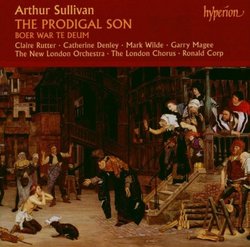| All Artists: Garry Magee, Arthur Sullivan, Ronald Corp, Catherine Denley, New London Orchestra, Claire Rutter, Mark Wilde Title: Arthur Sullivan: The Prodigal Son; Boer War Te Deum Members Wishing: 0 Total Copies: 0 Label: Hyperion UK Release Date: 1/13/2004 Album Type: Import Genre: Classical Style: Opera & Classical Vocal Number of Discs: 1 SwapaCD Credits: 1 UPC: 034571174235 |
Search - Garry Magee, Arthur Sullivan, Ronald Corp :: Arthur Sullivan: The Prodigal Son; Boer War Te Deum
 | Garry Magee, Arthur Sullivan, Ronald Corp Arthur Sullivan: The Prodigal Son; Boer War Te Deum Genre: Classical
|
Larger Image |
CD Details |
CD ReviewsSullivan Pays Homage to Mendelssohn--and Sullivan 05/21/2004 (4 out of 5 stars) "One reviewer I've read has said of Sullivan's "The Prodigal Son" that he would rather listen to it than to Mendelssohn's "Elijah." To invoke the name of Mendelssohn is to admit the obvious: Sullivan's chief, and it seems just about only, musical debt is to the German composer who hit it big in England. In fact, "The Prodigal Son" might be what Mendelssohn would have written if he had lived another 20 years, but I doubt it. The older composer seems to have turned a creative corner in the last year or so of his life, and I think he would have taken up the gauntlet thrown by Berlioz, Liszt, and Wagner (whose music mostly appalled him) in some interesting way or other if he had lived more than his allotted 39 years. At any rate, to prefer "The Prodigal Son" to "Elijah" is kind of baffling to me. Though Sullivan proved a great tunesmith in his operettas, the tunes in his sacred music fall short of his obvious model. For example, the aria "Love not the world" falls far short of "Elijah"'s very similar "O trust in the Lord," and the recitative followed by solo and chorus that describes the prodigal's alcoholic debauches is outdone by the scene in Mendelssohn in which Jezebel confronts Elijah and calls for his death. This despite the fact that the solo Sullivan wrote for the prodigal, the most memorable music in the piece, displays some interesting chromatic turns and twists--Sullivan's concession to modernity--and has a very apropos part for the side drum. On the other hand, the orchestral music in this solo is a knockoff of the fairy music from "A Midsummer Night's Dream." It's a nice knockoff, but I'll take Mendelssohn's overture and scherzo, thanks.And so it goes, for me at least. I've been there and heard that--and have much preferred the original.One of Sullivan's biggest misjudgments is the long and plodding chorus "O that men would praise the Lord," capped by a lame, perfunctory fugue. There's some pretty soupy, insincere-sounding stuff in Mendelssohn's choral music, but I can't think of anything that's as lame as this chorus by Sullivan (though afterward Sullivan almost redeems himself with a lovely quartet "The Lord is nigh"). But there are no such missteps in the Boer War Te Deum. This is an altogether more deeply felt work, the product of a musician who has something to say. Written in the last months of Sullivan's life, the Te Deum was to celebrate the end of the Boer War, though that dreadful conflict dragged on longer than anyone in England imagined it would. As it turned out, the first performance took place almost two years after Sullivan's death.The work is a brassy, big-throated affair as it should be, given the projected event for which it was written. But more significant is the air of world-weariness and resignation that Sullivan manages to weave through the work. This speaks not only to the burdens of empire that his nation was suffering toward the end of Victoria's reign, but perhaps also to the burdens of the last years of Sullivan's life, dogged as he was by sickness and professional disappointments. The most immediately apparent feature of the work, however, is the inclusion of Sullivan's own great hymn "Onward Christian Soldiers," which comes in for truly majestic treatment toward the end. Hearing it, you can't believe that God will ever let us be confounded, as the chorus demands at the end of the Te Deum. This work will move you.Conductor Ronald Corp is a Sullivan specialist, and he builds a magnificent edifice for the Te Deum. Certainly he does as much as he can for "The Prodigal Son" and is abetted by a very able vocal quartet and a fine chorus. The sound is up to Hyperion's usual high standards. I only wish I liked "The Prodigal Son" more; maybe you'll take to it better than I do. Because of the sterling performances and the presence of the Te Deum, I give this CD four stars."
|

 Track Listings (19) - Disc #1
Track Listings (19) - Disc #1